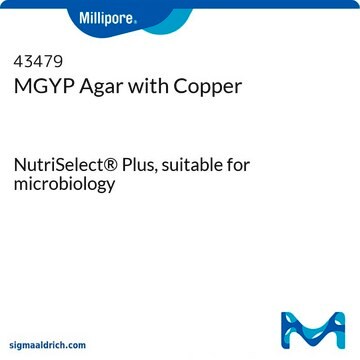17222
WL Nutrient Agar
suitable for microbiology, NutriSelect® Plus, for cultivation of microorganisms encountered in the brewing and fermentation industries
Synonym(s):
Wallerstein Laboratory Nutrient Agar
About This Item
Recommended Products
Quality Level
sterility
non-sterile
form
powder
shelf life
limited shelf life, expiry date on the label
composition
agar, 20 g/L
bromocresol green, 0.022 g/L
calcium chloride, 0.125 g/L
casein enzymic hydrolysate, 5 g/L
dextrose, 50 g/L
ferric chloride, 0.0025 g/L
magnesium sulfate, 0.125 g/L
manganese sulfate, 0.0025 g/L
monopotassium phosphate, 0.55 g/L
potassium chloride, 0.425 g/L
yeast extract, 4 g/L
manufacturer/tradename
NutriSelect® Plus
technique(s)
microbiological culture: suitable
final pH
5.5±0.2 (25 °C)
application(s)
bioburden testing
food and beverages
microbiology
suitability
nonselective and differential for Candida spp.
nonselective and differential for Escherichia coli
nonselective and differential for Lactobacillus spp.
nonselective and differential for Pichia spp.
nonselective and differential for Proteus spp.
nonselective and differential for Saccharomyces spp.
nonselective and differential for Zygosaccharomyces spp.
nonselective and differential for bacteria (General Media)
nonselective and differential for coliforms
nonselective and differential for molds (General Media)
nonselective and differential for yeasts (General Media)
General description
Application
- for reviving yeast stock cultures and for population dynamics studies post fermentation
- for morphological characterization of yeast isolated from cheese
- for plating fermented wine for yeast species isolation
Preparation Note
Footnote
The designations basic, plus, or prime are added to indicate the quality control level, from basic quality control to standard QC plus to prime for full regulatory compliance.
Legal Information
Storage Class Code
11 - Combustible Solids
WGK
WGK 3
Flash Point(F)
Not applicable
Flash Point(C)
Not applicable
Personal Protective Equipment
Choose from one of the most recent versions:
Already Own This Product?
Find documentation for the products that you have recently purchased in the Document Library.
Customers Also Viewed
Articles
Traditional methods are based morphology, staining methods, enzyme reactions (metabolism) and diverse media.
Cost-effective molecular biology method for lactobacilli detection is presented as an alternative to PCR-based methods.
Cost-effective molecular biology method for lactobacilli detection is presented as an alternative to PCR-based methods.
Cost-effective molecular biology method for lactobacilli detection is presented as an alternative to PCR-based methods.
Our team of scientists has experience in all areas of research including Life Science, Material Science, Chemical Synthesis, Chromatography, Analytical and many others.
Contact Technical Service













